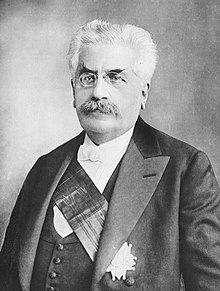Alexandre Millerand
Alexandre Etienne Millerand (born February 10, 1859 in Paris , † April 6, 1943 in Versailles ) was a French statesman of the Third Republic and influential politician of the last quarter of the 19th and the first quarter of the 20th century. From September 1920 to June 1924 he was President of the Republic as successor to Paul Deschanel .
Originally a socialist , Millerand, the son of a small wine merchant from a humble background, became a member of parliament in 1885 and a minister for the first time in 1899 against the will of his party. (See also: Millerandism .) As a lawyer, he defended several revolutionary activists, including Paul Lafargue , Karl Marx's son-in-law . In the Dreyfus affair , which divided the country, he was a lawyer who was vehemently committed to the Jewish officer who was accused of treason.
From 1899 to 1902 Millerand belonged to the government of the "Defense of the Republic" under the left-wing Prime Minister Waldeck-Rousseau . In the course of time he tended more and more to conservative views and finally gave up his socialist attitude completely. In 1904 he was expelled from the Socialist Party . Shortly afterwards he renounced Freemasonry . In 1911 he was one of the founders of the reform socialist Parti républicain-socialiste together with Aristide Briand .
Millerand held several ministerial offices (including minister of war). After the French victory in World War I , he acted as General Commissioner of the Republic for the reintegration of the territory of the former Alsace-Lorraine that Germany had regained . Millerand moved ever further to the right since the World War: He was the author of the election manifesto of the “National Bloc” ( Bloc national ), which emerged victorious in the 1919 parliamentary elections.
On January 20, 1920 he became Prime Minister and, following the inevitable resignation of Paul Deschanel due to a mental illness, on September 23, 1920 he was his successor as President of the French Republic. In his office he tried to play an active role, but had little leeway due to the Constitution of the Third Republic . After the victory of the left ( Cartel des Gauches ) in the parliamentary elections in 1924, the new majority forced his resignation on June 11th. The radical Gaston Doumergue was elected to succeed him.
After leaving the Elysée Palace, Millerand founded a new party, Ligue républicaine . He was elected to the Senate shortly afterwards , but without being able to play an important political role again. 1925–1927 he was senator for the Seine department ; 1927–1943 for the Orne department .
Millerand served as a patron of the Paris Summer Olympics in 1900 (in his capacity as Minister of Commerce) and the Chamonix Winter Olympics in 1924 (in his capacity as President ). He was the first person to patronize two Olympic Games; this was achieved after him by Adolf Hitler (Winter and Summer Games 1936) and Elisabeth II (1976 and 2012).
In his honor an island in Antarctica was named Île Millerand .
Web links
- Newspaper article about Alexandre Millerand in the 20th century press kit of the ZBW - Leibniz Information Center for Economics .
Individual evidence
- ↑ Knauer's Konversationslexikon 1934; P. 996
- ↑ The Brockhaus History, 3rd edition 2010, p. 578.
- ↑ Présidence de la République: Alexandre MILLERAND (1920-1924) . In: www.elysee.fr . ( elysee.fr [accessed February 27, 2017]).
- ↑ Alexandre Millerand | president of France . In: Encyclopedia Britannica . ( britannica.com [accessed February 27, 2017]).
- ↑ 23 September 1920 - Alexandre Millerand président de la République - Herodote.net. Retrieved February 27, 2017 (French).
- ↑ © 2008 - Alex Bernardini: Alexandre Millerand - Histoire de France. Retrieved February 27, 2017 (French).
| predecessor | Office | successor |
|---|---|---|
| Georges Clemenceau |
Prime Minister of France January 20, 1920–24. September 1920 |
Georges Leygues |
| Stéphen Pichon |
Foreign Minister of France January 20, 1920–24. September 1920 |
Georges Leygues |
|
Adolphe Messimy Adolphe Messimy |
Minister of War of France January 14, 1912–12. January 1913 August 26, 1914–29. October 1915 |
Albert Lebrun Joseph Simon Gallieni |
| personal data | |
|---|---|
| SURNAME | Millerand, Alexandre |
| ALTERNATIVE NAMES | Millerand, Alexandre Etienne (full name) |
| BRIEF DESCRIPTION | French statesman and politician |
| DATE OF BIRTH | February 10, 1859 |
| PLACE OF BIRTH | Paris , France |
| DATE OF DEATH | April 6, 1943 |
| Place of death | Versailles , France |

